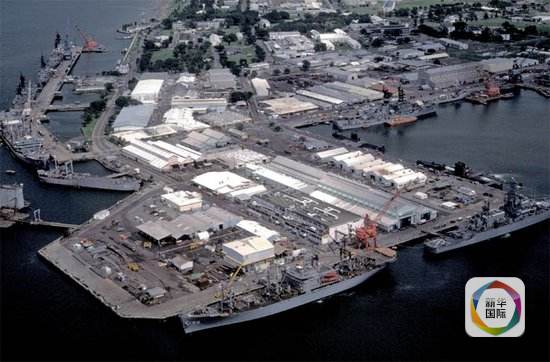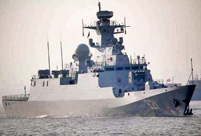


The U.S. and the Philippines recently held the sixth bilateral strategic dialogue. Media reports said that the U.S. military is granted access to five military bases in the Philippines based on the Enhanced Defense Cooperation Agreement (EDCA), which was approved by both sides. The U.S. fleet and troops can now use these bases near the South China Sea to conduct “maritime security operations.”
As part of the Asia-Pacific rebalancing strategy adopted by the U.S., the EDCA will enable more U.S. military presence in the Philippines and push America’s “pivot to Asia.”
An official from the U.S. Defense Department who participated in the dialogue claimed that the U.S. will fund the Philippines to improve its radar facilities and other technology that helps to monitor disputed islands and reefs in the South China Sea.
With the South China Sea situation heading toward stability, such military action from the U.S. and the Philippines has attracted attention. Recently, the U.S. has been accusing China of militarization, which in reality is nothing more than the limited and necessary deployment of defense facilities on China’s own islands and reefs.
What’s ridiculous about this U.S.-Philippines strategic dialogue is that even as both sides voice strong opinions against militarization of the South China Sea, both sides are also agreeing to open more military bases in the region. Both countries even explicitly acknowledged the goal of expanding U.S. military presence in the area. Such a double standard is unacceptable.
After the Cold War, the U.S. military never left the Asia-Pacific region. Since 2009, when the U.S. adopted the Asia-Pacific rebalancing strategies, the superpower has planned to send 60 percent of its air and maritime forces to the region by 2020. It is obvious that the U.S. is the party pushing militarization in the Asia-Pacific region.
China has fewer strategic arms such as nuclear submarines, strategic bombers, land-based intercontinental ballistic missiles and aircraft carriers. What’s more, China has conducted far fewer military exercises in the South China Sea than the U.S. has, and always on a smaller scale. The blame for militarization should by no means be placed on China.
The Philippine islands are to the west of the South China Sea, a location with great significance in the region. After over 20 years of being absent from Philippines, the U.S. military's re-entry to the region is very significant. It is a crucial step for the Asia-Pacific rebalancing strategy.
The U.S. air force base in Palawan Island is less than 500 kilometers from the Nansha Islands. U.S. military jets at the base could reach the Nansha Islands within 30 minutes. Compared with the Kadena U.S. Air Force Base in Okinawa, Japan, the Palawan base shortens flight time to less than one third of what it was before, leaving more time for action above the targeted area. Obviously, these military bases in the Philippines would be an ideal springboard for the U.S. to gain control of the region.

The U.S. has many military bases in the South China Sea, including one in Subic, Philippines and a naval base in Singapore. However, the U.S. should keep in mind that there have been protests in the Philippines over the decision to let the U.S. military use the country’s bases. Recently, a non-governmental organization in the country issued a statement against the decision.
In accordance with the Philippines-U.S. Visiting Forces Agreement, the EDCA will not promote the modernization of the Philippines military. What the country really needs is economic development and national industrialization, and they cannot achieve those things by becoming a “colony” of the U.S.
This situation is a provocation to China, and it will not stand. The increasing military presence of the U.S. in the South China Sea will only accelerate militarization in the region, encourage countries like the Philippines to provoke China, and intensify regional tensions. It is not conducive to regional peace and stability.
(The author is a research fellow at China's Naval Research Institute)
 Thai most beautiful transgender Nong Poy release new photos
Thai most beautiful transgender Nong Poy release new photos Now and then photos of Shanghai Jiaotong University
Now and then photos of Shanghai Jiaotong University Is this what air travel will look like in 2050?
Is this what air travel will look like in 2050? Aerial view of watermelon terraces in S China's Baise
Aerial view of watermelon terraces in S China's Baise Traditional wedding of a post-80s Tibetan couple
Traditional wedding of a post-80s Tibetan couple Models in cheongsams present classical oriental beauty
Models in cheongsams present classical oriental beauty Second commissioned C28A corvette made by China enters Algerian Navy
Second commissioned C28A corvette made by China enters Algerian Navy Intoxicating Wuyuan in spring
Intoxicating Wuyuan in spring Gold and silver wares of Qing Dynasty exhibited in Shenyang Imperial Palace
Gold and silver wares of Qing Dynasty exhibited in Shenyang Imperial Palace Top 20 hottest women in the world in 2014
Top 20 hottest women in the world in 2014 Top 10 hardest languages to learn
Top 10 hardest languages to learn 10 Chinese female stars with most beautiful faces
10 Chinese female stars with most beautiful faces China’s Top 10 Unique Bridges, Highways and Roads
China’s Top 10 Unique Bridges, Highways and Roads Brussels attacks expose vulnerable Europe
Brussels attacks expose vulnerable Europe Govt mulls ways to curb forex speculation
Govt mulls ways to curb forex speculation Without proper pensions, 46 mln elderly migrant workers cannot retire
Without proper pensions, 46 mln elderly migrant workers cannot retire Countries across the world have begun pasting graphic images on their cigarettes – why China isn’t likely to follow suit
Countries across the world have begun pasting graphic images on their cigarettes – why China isn’t likely to follow suitDay|Week